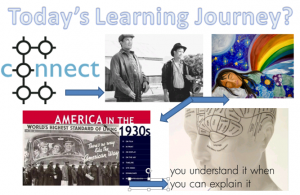Thinking About Questioning
This is a guest blog post by Jane Haggath
“Ignorance is a temporary affliction, remedied only by asking the right questions.”Colin Wright
Okay, so as a woman, asking questions is part of my daily repertoire. After all, women like to know everything! But asking thought-provoking and engaging questions might just not come as easily and, maybe planning for them is actually necessary, if we want them to form an impact…
For quite some time now the significance of questioning has been at the forefront of many educational texts. And, those techniques we’d employed rather naturally and in all honestly haphazardly have now been re-branded and given a variety of names reminiscent of Disney characters. Whilst this may ruffle the feathers of some old hands, I think there is an importance in doing so because by making the techniques explicit, hopefully we raise the significance they play in us doing our jobs properly? For example, if breaking into a Jackson signature tune helps remind us to Apply, Build and Challenge (ABC) then so be it.
Once you start thinking more deeply about the use of questioning there are numerous barriers that spring to mind. When used as a superficial tool to simply check and reiterate content, questioning becomes little more than a ‘guess what’s in my head’ game for the teacher. For your brighter students this is dull but reaffirming as they lazily raise a hand, but for your lower end it simply serves to re-enforce the assumptions they hold about themselves already: that they’re ‘thick’ because they don’t know the answer. With this realisation, came a little moment of light-bulb action – questioning should foster a range of skills rather than simply check subject knowledge.
Following Jon’s AGSinspire session it was the relationship between the question and engagement that really began to stir my curiosity. If we could hook the kids right from the off, whilst making them think for themselves about not only the lesson but the ‘bigger picture’ of where they were going, then surely this was a Holy Grail to be quested for? With a Kopparberg in hand (I find it dulls the pain somewhat) I returned to Google and some educational books in hope of an answer…and lurking in David Didau’s ‘Perfect Ofsted Lesson’ I found something intriguing. Didau paraphrased that a “careful scrutiny of the research (Geoff Petty) shows that the first ten minutes of the lesson can have a massive impact on learning and progress.” In order to achieve the impact he recommended using a combination of a visual representation of what would be learnt during the lesson; learning intentions that were NOT outcome based but focused on what would be learnt; questions that recalled prior knowledge but made students think for themselves about where they were going. These factors could be combined and used effectively through a simple ppt slide, used at the beginning of the lesson, that questioned the students to think for themselves about their own learning journeys.
And here is what they looked like once made:
At first –probably because it was something a bit ‘new’ – the slide seemed a bit confusing to the students. However, their natural curiosity soon kicked in and they began puzzling over and discussing their ideas about the lesson: what would it be about; what would they be doing; what would they be learning about and how did it fit with previous and future learning? Bingo! This was exactly what I’d hoped for. And I hadn’t even opened my mouth and asked anything. Instead the questioning was planned and prepared earlier and they were thinking and discussing for themselves. And, because of the diversity of this form of questioning, it was great differentiation because students could attain something unique to themselves and their own experience regardless of their starting points.
Once they had mulled it over and discussed, it was time to employ the Tigger approach with a spot of Pose, Pause and Pounce. Now, due to the initial use of Think, Pair and Share time whilst pondering the slide, the answers received were far deeper than previously seen and ensured a more rapid pace of progress was ensured from the off.
Will it work all the time? I don’t know. But I’m certainly more open to thinking and questioning myself about my teaching and planning of questioning.
Written by Jane Haggath






